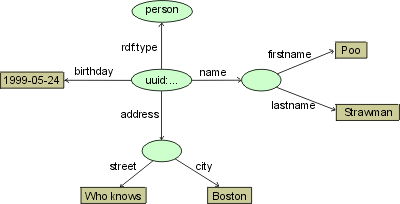Simplified Syntax for RDF
This is a complementary proposal for a simplified RDF
syntax inspired by Tim's
strawman
draft. A reference implementation is available.
Requirements for the syntax:
-
simplicity: self-explanatory
-
as context-free as possible
-
allow mixing XML with RDF
XML attributes controlling the behavior of the RDF processor that are used
in this document are:
-
rdf:instance (says that the containing tag is a class name)
-
rdf:for (the containing tag is a property name, the value of the
attribute is the subject URI)
-
rdf:resource (the containing tag is a property name, the value
of the attribute is the object URI)
rdf:instance cannot be used together with rdf:for or
rdf:resource.
Pure RDF
RDF follows a property-centric approach. Let the syntax reflect it. Every
XML tag encountered during processing is considered to be a property name,
unless explicitly overriden. For a tag to be a class name, it must carry
the XML attribute
rdf:instance. Example:
<person rdf:instance="uuid:...">
<name>
<firstname>Poo</firstname>
<lastname>Strawman</lastname>
</name>
<birthday>1999-05-24</birthday>
<address>
<city>Boston</city>
<street>Who knows</street>
</address>
</person>
The RDF model of the example is:

Tag interpretation does not switch back and forth between class name
and property name. Instead, RDF processor can determine in a context-free
fashion that the tag name is a class iff it carries rdf:instance.
In all other cases, tag name denotes a property.
Complete parsing algorithm
Definition: The function "URI getUniqueURI(Element el)"
is a one-to-one function that returns a unique URI for a given XML element
(relative to the URI of the document). The function could be based on the
XPath specs.
Definition: The function "Resource getSubject(Element el)"
is
defined as follows:
-
if el has attribute rdf:instance, the value of the function
is the value of rdf:instance
-
if el has attribute rdf:resource, the value of the function
is the value of rdf:resource
-
if el has neither rdf:instance, nor rdf:resource,
return getUniqueURI(el)
-
otherwise undefined
In the subsequent definition, PCDATA is used interchangeably with "PCDATA
or CDATA".
Definition: The function "RDFNode getObject(Element el)"
is defined as follows:
-
if el has attribute rdf:resource, the value of the function
is the value of rdf:resource
-
if el has no rdf:resource and no subelements, the value
of the function is a literal representing PCDATA of el. Empty
literal, if el is empty.
-
if el has subelements, return getUniqueURI(el)
-
otherwise undefined
Algorithm: For a given XML subtree with the root element el,
the corresponding RDF model is generated according to the following algorithm:
void generateRDF(Element el) {
if hasRDFInstanceAtt(el) {
createTriple( valueOfRDFInstanceAtt(el), rdf:type,
el.getTagName() ); // ***
} else { // has no rdf:instance
if hasRDFForAtt(el)
subject = valueOfRDFForAtt(el);
else
subject = getSubject(el.getParent());
createTriple( subject, el, getObject(el) );
}
for every ch in children(el)
generateRDF(ch);
}
***: do not explicitly generate triples of the kind (subject, rdf:type,
rdfs:Resource)
FIXME: shoud we prohibit that both child and parent have rdf:instance?
Examples
Example: Serialization for figure 1 in RDF M&S
<Creator rdf:for="http://www.w3.org/Home/Lassila">Ora Lassila</Creator>
is equivalent to
<rdfs:Resource rdf:instance="http://www.w3.org/Home/Lassila">
<Creator>Ora Lassila</Creator>
</rdfs:Resource>
Example: Serialization for figure 2 in RDF M&S
<Creator rdf:for="http://www.w3.org/Home/Lassila">
<Name>Ora Lassila</Name>
<Email>lassila@w3.org</Email>
</Creator>
Example: Serialization for figure 3 in RDF M&S
<Creator rdf:for="http://www.w3.org/Home/Lassila" rdf:resource="http://www.w3.org/staffId/85740">
<Name>Ora Lassila</Name>
<Email>lassila@w3.org</Email>
</Creator>
Notes
-
Neither rdf:RDF nor rdf:Description are needed any more.
RDF processor skips all valid XML until it finds a tag having rdf:instance
or rdf:for.
-
getSubject() and getObject() are NOT recursive. Therefore,
application of the parsing algorithm is structurally equivalent with a
depth-first traversal of XML subtree.
-
There is no abbreviated syntax any more.
-
This document does not consider reification. For the sake of simplicity,
reification should probably be expressed on a lower level of granularity,
i.e. reifying a single statement at a time.
Mixing RDF with XML
THIS SECTION IS OBSOLETE: see "Bridging
the Gap between RDF and XML"
To mix RDF with XML the parser needs a clue wrt whether the XML elements
under consideration are RDF-transparent or should be evaluated as RDF.
It would be helpful to have a mechanism for the parser to make this distinction
based on the namespace of the element (I'm tempted to say something like
"rdfns:dc=..." albeit I'm aware of the problems of this approach).
If there is such mechanism, the above algorithm can be modified to "see
through" all non-RDF tags (we are talking about hints for the parser, so
what about (mis)using processing instructions for that purpose a la <?rdfns
http://... ?rdfns>).
Example:
<t:WebPage xmlns="<HTML
namespace>" xmlns:rdf="..." xmlns:t="..." xmlns:dc="..."
rdf:instance="<URL
of this page>">
<html>
<head>
<title>
<dc:Title>My
homepage</dc:Title>
</title>
</head>
<h1>...</h1>
...
<p/><hr/>
Last modified by: <dc:Creator>Me</dc:Creator>
</html>
</t:WebPage>
Sergey
Melnik, Nov 19, 1999. Last change: Dec 16, 1999

